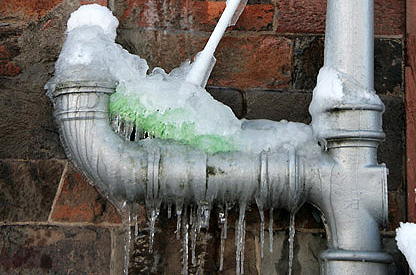Essential Advice to Protect Against Frozen Pipes in Cold Weather
Essential Advice to Protect Against Frozen Pipes in Cold Weather
Blog Article
This great article following next on the subject of How to Prevent Your Pipes From Freezing is without a doubt attention-grabbing. Read it yourself and figure out what you think of it.
:strip_icc()/snow-outdoor-faucet-pipes-4af65d1e5e904fb1aa7bf74071fe5d89.jpg)
Cold weather can ruin your pipes, specifically by freezing pipes. Below's just how to stop it from occurring and what to do if it does.
Intro
As temperatures decrease, the risk of frozen pipelines increases, possibly leading to expensive fixings and water damages. Understanding exactly how to avoid icy pipelines is crucial for homeowners in cold climates.
Comprehending Icy Pipes
What triggers pipes to freeze?
Pipelines ice up when subjected to temperatures below 32 ° F (0 ° C) for expanded durations. As water inside the pipes freezes, it broadens, taxing the pipe wall surfaces and potentially causing them to break.
Dangers and damages
Icy pipes can bring about water system disruptions, property damage, and costly repairs. Burst pipelines can flood homes and cause extensive structural damages.
Indications of Frozen Pipes
Determining frozen pipelines early can prevent them from breaking.
Exactly how to identify icy pipelines
Seek decreased water circulation from faucets, uncommon odors or sounds from pipelines, and visible frost on revealed pipes.
Avoidance Tips
Insulating vulnerable pipelines
Wrap pipes in insulation sleeves or use heat tape to safeguard them from freezing temperatures. Concentrate on pipelines in unheated or outside areas of the home.
Home heating techniques
Keep interior areas appropriately warmed, especially locations with plumbing. Open up closet doors to allow cozy air to flow around pipelines under sinks.
Safeguarding Outdoor Pipes
Yard hose pipes and outside faucets
Separate and drain yard pipes prior to winter months. Set up frost-proof faucets or cover exterior faucets with protected caps.
What to Do If Your Pipelines Freeze
Immediate actions to take
If you suspect frozen pipelines, maintain faucets open to soothe pressure as the ice melts. Utilize a hairdryer or towels soaked in warm water to thaw pipes slowly.
Long-Term Solutions
Architectural modifications
Consider rerouting pipes far from outside walls or unheated areas. Include extra insulation to attics, cellars, and crawl spaces.
Updating insulation
Buy top quality insulation for pipelines, attics, and wall surfaces. Proper insulation assists keep consistent temperature levels and minimizes the danger of icy pipelines.
Final thought
Stopping frozen pipes calls for aggressive measures and quick reactions. By understanding the causes, indications, and preventive measures, property owners can safeguard their pipes during cold weather.
Helpful Tips to Prevent Frozen Pipes this Winter
UNDERSTANDING THE BASICS: WHY PIPES FREEZE AND WHY IT’S A PROBLEM
Water freezing inside pipes is common during the winter months, but understanding why pipes freeze, and the potential problems it can cause is crucial in preventing such incidents. This section will delve into the basics of why pipes freeze and the associated problems that may arise.
THE SCIENCE BEHIND FROZEN PIPES
When water reaches freezing temperatures, it undergoes a physical transformation and solidifies into ice. This expansion of water as it freezes is the primary reason pipes can burst. As the water inside the pipe freezes, it expands, creating immense pressure on the walls. If the pressure becomes too great, the pipe can crack or rupture, leading to leaks and water damage.
FACTORS THAT CONTRIBUTE TO PIPE FREEZING
Low Temperatures: Extremely cold weather, especially below freezing, increases the risk of pipes freezing. Uninsulated or Poorly Insulated Pipes: Pipes located in unheated areas, such as basements, crawl spaces, or attics, are more prone to freezing. Insufficient insulation or lack of insulation altogether exacerbates the problem. Exterior Wall Exposure: Pipes running along exterior walls are susceptible to freezing as they encounter colder temperatures outside. Lack of Heating or Temperature Regulation: Inadequate heating or inconsistent temperature control in your home can contribute to frozen pipes. PROBLEMS CAUSED BY FROZEN PIPES
- Pipe Bursting: As mentioned earlier, the expansion of water as it freezes can cause pipes to burst, resulting in significant water damage.
- Water Damage: When pipes burst, it can lead to flooding and water damage to your property, including walls, ceilings, flooring, and personal belongings.
- Structural Damage: Prolonged exposure to water from burst pipes can compromise the structural integrity of your home, leading to costly repairs.
- Mold and Mildew Growth: Excess moisture from water damage can create a favorable environment for mold and mildew growth, posing health risks to occupants.
- Disrupted Water Supply: Frozen pipes can also result in a complete or partial loss of water supply until the issue is resolved.
WHY CERTAIN PIPES ARE MORE PRONE TO FREEZING
- Location: Pipes located in unheated or poorly insulated areas, such as basements, crawl spaces, attics, or exterior walls, are at higher risk of freezing.
- Exterior Pipes: Outdoor pipes, such as those used for irrigation or exposed plumbing, are particularly vulnerable to freezing as they are directly exposed to the elements.
- Supply Lines: Pipes that carry water from the main water supply into your home, including the main water line, are critical to protect as freezing in these lines can affect your entire plumbing system.
- Underground Pipes: Pipes buried underground, such as those connected to sprinkler systems or outdoor faucets, can be susceptible to freezing if not properly insulated.
https://busybusy.com/blog/helpful-tips-to-prevent-frozen-pipes-this-winter/

As a serious person who reads on Prevent Frozen Pipes , I think sharing that editorial was smart. Feel free to take the time to distribute this write-up if you appreciated it. Thanks so much for taking the time to read it.
Request Appointment Report this page